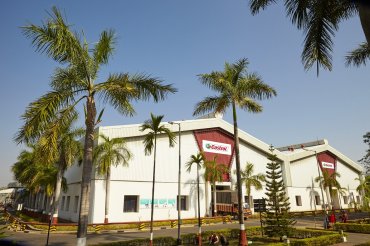Castrol India Ltd. plans to expand its Silvassa blending plants capacity by 50 percent by 2021 to adapt to the changing landscape of the Indian lubricant industry and to meet growing demand, a company official said.
The lubricant blending plant, which has production capacity of 100 million liters per year now, currently produces about 80 million liters annually.

Photo courtesy of Castrol India
The Silvissa plant is located in the Indian Union Territory of Dadra and Nagar Haveli, in western India. The facility’s capacity will increase by 50 percent by 2021.
The company plans to invest around Rs 140 crore (Rs 1.4 billion or about U.S. $20 million) over the next two years to scale up the capacity of its Silvassa plant in western India by 50 percent, said Omer Dormen, managing director at Castrol India. This will increase its production capacity to 150 million liters per year.
This project will involve setting up of new tank farms, blending facilities and faster and high-tech filling and packaging lines in the Silvassa plant, Dormen told Lube Report. He said the expansion will enhance the companys production agility so that it can meet demand that is moving towards smaller-sized packs.
Dormen said right now is an exciting phase for the lubricant industry in India – the worlds third-largest market – because demand is expected to grow, driven by vehicles sales. Additionally, technology advancement in the segment will lead to increased demand for higher quality lubricants to meet new emission norms.
Rising economic growth is leading to increased industrial activity and consumer income. This in turn drives the sales of cars and motorcycles, leading to faster growing lubricant consumption, Dormen stated.
India’s domestic automobile sales – including passenger vehicles, commercial vehicles, three-wheelers, two-wheelers and quadricycles – increased 12.7 percent year on year to 26.8 million units and exports surged 20 percent to 4.6 million units in 2018, according to the Society of Indian Automobile Manufacturers. Total two-wheeler sales rose 12.8 percent to 21.6 million units.
The lubricant maker projects that Indias current vehicle parc in India will grow by about 88 million vehicles over the next five years. It also expects growth in the infrastructure and manufacturing sectors due to growth in the Indian economy.
Overall, we expect to see the Indian vehicle parc growing at a [compound annual rate] of 11 percent for the next five years, which provides an extremely exciting opportunity for growth in our business, Dormen said.
The Mumbai-based firm said it sees a demand shift towards high premium and thinner synthetic oils in the four-wheeler segment, driven by new engine technology. It added that all original equipment manufacturers are focusing on getting ready for the transition to Bharat Stage VI automobile emissions standards in 2020 by producing fuel efficient engines, and Castrol is actively working with them on new products to meet the approaching BS VI emission legislation changes in India.
India plans to leapfrog from the current BS IV automobile emissions standard directly to BS VI in April 2020, skipping BS V to tackle the nations worsening air pollution. BS VI is equivalent to the European Unions Euro 6 standard and is expected to force engine design changes that require more advanced engine oils.
Talking about the personal mobility segment, Dormen said it has experienced significant boost in vehicles sales, both for two-wheelers and four-wheelers, as Indian households are generating higher disposable incomes. He added that first time users of personal mobility vehicles along with growth in usage of two-wheelers in small towns and rural areas, as well as emergence of gearless scooters, driven by increasing number of women riders has also led to a significant growth in two-wheeler sales.
The company said a drive for fuel efficiency as well as extended oil drain intervals characterizes the commercial segment. It also sees an increase in the last-mile delivery segment driven by a rise in mini light commercial vehicles, one of the key focus areas for Castrol, whose competitors include Gulf Oil Lubricants India Ltd., Shell, Valvoline and Hindustan Petroleum Corp.
We are geared up to introduce high-technology premium products for each of the market spaces, which would exceed the lubrication needs of such vehicles, Dormen said.
Castrol – whose brands include Edge, Magnatec, GTX and Activ – said it launched new products across all categories in the last 18 months along with greases and transmission oils, and that 80 percent of its growth in 2018 came from new product introductions alone.